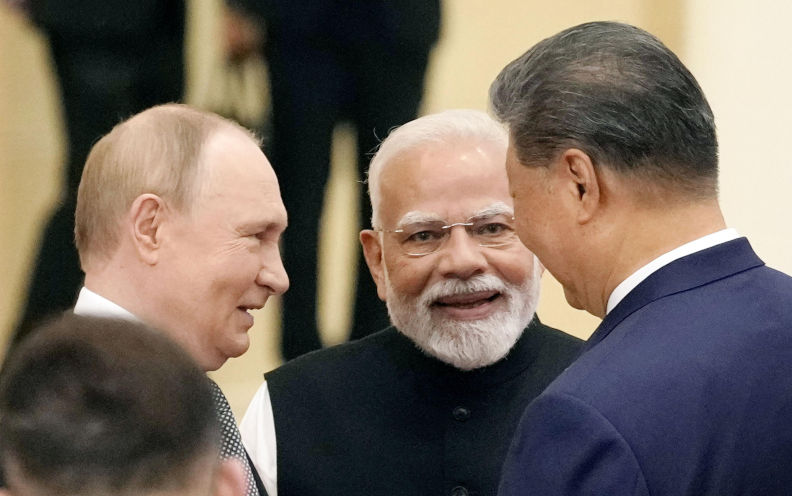Global power shift on show at China summit
September 4, 2025
The sight of Indian Prime Minister Narendra Modi embracing Russian President Vladimir Putin, before the two walked over hand in hand to greet Chinese President Xi Jinping, with the three leaders then sharing a conversation marked by smiles, laughter and general bonhomie, will be one haunting many Western leaders.
That episode took place at the just completed Summit of the Shanghai Co-operation Organisation, held in Tianjin, China, on 31 August and 1 September.
What began in 2001 as a modest security forum among six nations — China, Russia, Kazakhstan, Kyrgyzstan, Tajikistan and Uzbekistan — the SCO has evolved into a powerful platform for regional co-operation, this summit being its largest.
The accession of India and Pakistan in 2017, Iran in 2023, and Belarus in 2024, has seen the SCO grow to 10 full members, representing nearly half the world’s population, with 23% of global GDP, though that rises to 36% when GDP is based on Purchasing Power Parity.
Along with the 10 member states there are two partner countries, Afghanistan (inactive since the Taliban came to power in 2021) and Mongolia, with another 15 nations as “dialogue partners”: Armenia, Azerbaijan, Bahrain, Cambodia, Egypt, Kuwait, Maldives, Myanmar, Nepal, Qatar, Saudi Arabia, Sri Lanka, Turkey and the United Arab Emirates, with this summit admitting Laos as the 15th dialogue partner.
The SCO, comprising nearly 80% of the Eurasian landmass, is the world’s largest contiguous organisation, stretching from Southeast Asia to the edge of Europe, providing great advantage for work on a range of areas from economic connectivity, to environment and security.
While the organisation’s initial focus was on counterterrorism and regional stability, economics is now core in binding its members.
A China initiative, that country still lies at the SCO’s core with China’s trade with SCO nations rising in 2024 to a record US$512.4 billion. When observers and dialogue partners are included, the figure grows to US$890 billion.
Infrastructure development is central, with highways, railways and energy pipelines bringing together economies, frequently neglected by Western capital, often doing so by making use of national currencies in mutual settlements.
That will now be further propelled by the creation of a SCO Development Bank, something on the SCO agenda for the past decade, and officially launched at this summit. This, along with a push toward yuan-denominated trade and digital payment systems, will act to circumvent the US dollar, and the danger of US sanctions.
China announced that it would also build an artificial intelligence co-operation centre for SCO nations, while also inviting them to participate in China’s lunar research station.
Alongside other China led initiatives, BRICS+ and the Belt and Road Initiative, the SCO presents an enormous challenge to the Western-led global order. It stands as another sign of the rapid erosion of Western-led unipolarity, and the rise of a more multipolar global order.
The desire for such change is seen in Chinese President Xi Jinping announcing a Global Governance Initiative, to join the three earlier “initiatives” on security, development and civilisation, each of which outline a reshaped international order.
Pledging to increase the representation and voice of developing countries and practice of multilateralism, Xi announced, “I look forward to working with all countries for a more just and equitable global governance system”, before charging, “We should advocate an equal and orderly multipolar of the world, and a universally beneficial and inclusive economic globalisation and make the global governance system more just and equitable.”
Present at the gathering was the UN General-Secretary Antonio Gutterres who, responding to Xi’s vision, affirmed the importance of China’s contribution to the global multilateral order, before praising Xi as a man with a “clear strategic vision”.
Echoing Xi’s remarks, Russian President Putin said the SCO laid the groundwork for a “new system” of security in Eurasia, positioning it as an alternative to Western-led alliances.
The new system, Putin declared, “would replace the outdated Eurocentric and Euro-Atlantic models, take into account the interests of the broadest possible range of countries, be truly balanced, and would not allow attempts by some states to ensure their security at the expense of others”.
Crucial at the meeting was the rapprochement between China and India, with this being Indian Prime Minister Modi’s first visit to China in seven years, following relations taking a nosedive over the “line of control” clash between the two nations in the Himalayas.
This warming of relations was confirmed in Modi’s opening remarks, in which he noted, relations with China have moved in “a meaningful direction”, adding of the previous sore point, “there is a peaceful environment at the borders after disengagement”.
The rapprochement between the two nations is significant. Washington had been wooing New Delhi to its side, but any bromance was rudely interrupted by the Trump regime recently placing a 50% tariff on Indian imports. Trump it appears, enjoys shooting US interests in the foot.
Clearly expressing annoyance with the US, Modi said, “India and China both pursue strategic autonomy, and their relations should not be seen through a third country lens.”
Of another relationship which has greatly annoyed the US, that between India and Russia, the Indian leader reaffirmed the close relationship.
Claiming he had an “excellent meeting” with Putin, in which they explored further co-operation “in all sectors”, Modi said of Russia, “our special and privileged strategic partnership remains a vital pillar of regional and global stability”.
As the US increasingly withdraws into isolation and incoherency, something which has thrown Western nations into confusion, new networks are swiftly being built. New nations are being brought into not only the SCO, but also BRICS+ and the Belt and Road Initiative.
The geopolitical order is not only changing, it is changing rapidly.
The views expressed in this article may or may not reflect those of Pearls and Irritations.


